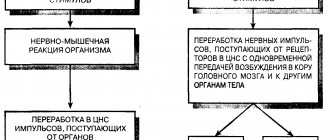Self-control today is an important quality of human character. In an age of competition and the pursuit of career growth, trying to combine all this with family comfort requires a lot of endurance. It is necessary not only to “not bring home the work mood,” but also to be able to accept daily difficulties with dignity and ease.
Self-control means the ability to remain calm
Definition
Self-control is the ability to maintain internal control in any situation due to the presence of certain qualities. These include courage, determination, and the presence of willpower.
To control the emotions seething inside and not let them out, you need to have a large amount of additional energy. Some people cope with emotional outbursts with a single breathing technique, while others require extensive practice to remain calm.
Self-control is useful in the following situations:
- Change of job or field of activity. Change scares people. In the first days in a new place, a person experiences severe stress. It is associated with a number of doubts about joining an unfamiliar team or the ability to cope with the assigned tasks.
- Loss of loved ones. In this situation we are talking about serious psychological trauma. Such mental wounds take a long and painful time to heal. At such moments, it is important to have a shoulder nearby that you can lean on in difficult times.
- Sessions. Passing exams for students is a period of heightened anxiety. For most examinees, emotional shocks have a negative impact on the general condition of the body - headaches, sweaty palms, and loss of appetite. There is only one way out of this state - to pull yourself together and, through an effort of will, overcome the fear of the upcoming test for the sake of its successful outcome.
- Resentment. Harsh remarks or a negative assessment of any actions lead to disappointment in oneself and a complete loss of self-confidence, especially if they were expressed by a loved one.
Self-control is an important character trait. Anyone who has developed it in himself remains a happy person for the rest of his life.
Are you ready to stop thinking about your problem and finally move on to real actions that will help you get rid of your problems once and for all? Then perhaps you will be interested in this article .
The skill of using self-control in conflict situations will help you avoid unpleasant consequences.
The difference between self-control and endurance
People sometimes confuse the concepts of endurance and self-control.
The first refers to a person’s ability to stand his ground to the end, regardless of the level of difficulty of the obstacle. One of the main manifestations of endurance is stoicism. It helps to endure life’s adversities, mental anguish and suffering. In other words, endurance is the ability to activate the inhibitory functions of a person’s will and turn off feelings and emotions that may interfere with the implementation of plans. People with this quality choose the right level of activity that suits specific circumstances.
The main difference between self-control and self-control is emotional control. In the first case, all feelings and emotions are relegated to the background, in the second, they are carefully controlled.
People develop both qualities as they grow older.
Definition of the concept
What is self-control? By definition in psychology, self-control is a person’s ability to maintain inner peace and emotional stability with the help of such personal qualities as determination, willpower and courage. An individual with well-developed self-control can think calmly even in critical situations, carefully controlling his own emotions and feelings.
What does it mean to lose self-control? This is a phenomenon when emotions get out of a person's control. In this case, hysteria or stupor may occur, in which the human nervous system is seriously affected.
The Art of Self-Control
The ability to control oneself and remain calm in any situation, tolerance when communicating with people, the ability to act under the influence of the mind and not the heart - these are the qualities that characterize the art of self-control. A person who has mastered it acquires the qualities of a leader and is able to lead others.
The art of self-control allows you to get rid of doubts, restrain anger and other negative emotional impulses, and maintain balance in critical situations. The ability to show restraint and make informed decisions reveals strong-willed human nature.
The following obstacles may arise on the path to mastering such an art:
- Self-doubt is a person’s main companion. Because of it, people lose courage and determination. To overcome this feeling, you need to change your attitude towards yourself - feel your inner strength, get rid of anxiety and laziness.
- Temptations. The ability to resist them means saying no to some desires and not giving in to social pressure. You need to be patient, gather your willpower and go towards your goal.
- Emotional resistance - manifests itself in uncertainty and doubts before making any decision regarding changes in the usual way of life. If a person is going to do something new, he has set aside a specific period of time, and at that very moment he will want to quit everything and do something else. In the process of acquiring the skill of self-control, at first a person is always accompanied by an internal struggle with himself.
Most of the difficulties on the path to self-control are brought to a person by the people around him and his own ego. It is especially difficult to adjust the regime and habits established over the years at first. In times like these, it's more important than ever to take time to learn self-control.
Change the object of attention
To do this, just count to ten. If you can't count while you're talking, take a break. Answer the phone, drink water, or talk to another person. The ability to speak beautifully is often associated with the ability to “recharge.” This is especially true for exhausting difficult negotiations that last for hours: this way you can reset the accumulated negativity and restore sobriety to your thoughts. The art of influencing people is based on gaining an advantage. In difficult negotiations, the advantage goes to the one who manages to take a break.
Don't close your eyes and try to think about good things, it never works. Only an activity allows you to really get distracted and not be nervous; find one for yourself. Sharpen your pencil, clean your computer monitor, refresh your phone browser. The main thing is to do something.
Self-control and its loss
There are moments when a person loses control over himself and is led by emotions, thus betraying internal values. The consequences of losing self-control are quite sad:
- deep feeling of shame;
- a state of permanent hysteria;
- venting negative emotions through harming things or quarrels with loved ones;
- loss of respect from people who witnessed the emotional breakdown;
- imbalance of the nervous system.
People don't lose their temper overnight. This is facilitated by a series of circumstances that occur over a certain period of time.
A person who practices the development of self-control catches the first signs of irritation and suppresses them in himself. The main problem for many is the inability to recognize alarm bells. At the moment of loss of self-control, people lose control of themselves, words and emotions, after which the realization of what happened comes, mixed with a pressing feeling of guilt and shame.
It is very easy to change others, but much more difficult to change yourself. (Oscar Wilde)
Abstract yourself
To disengage, you need to understand that you are losing control in one of the three ways suggested above. When this fact is no longer in doubt, think about how you look from the outside. Evaluate your gestures, words, intonations, think about what you say and how. The essence of the technique is that from the outside it is easier to correctly and qualitatively evaluate behavior. If you can take on the role of an observer, you will be able to determine where you are going too far. In addition, the very fact of changing the object of attention will play into your hands, because you will stop thinking about the stimulus and start thinking about your own reaction to it.
How to Maintain Composure
Staying calm like a boa constrictor in any situation is quite difficult for most people. Trying to control yourself sometimes has a negative impact on the nervous system.
The ability to maintain self-control is influenced by the following factors:
- Education and environment. In families without quarrels and conflicts, a child from an early age is raised in an atmosphere of love and peace. He develops self-control skills automatically. A person for whom emotional outbursts have been the norm since childhood will face difficulties in controlling feelings and emotions as an adult. Tactfulness is especially important when communicating with teenagers - during the transition period, children are in an unstable emotional state, which is caused by hormonal changes.
- Physical state. People's general well-being directly affects their internal feelings. If a person has not had enough sleep for a long time, has not eaten regularly and feels physically exhausted and exhausted, it will be difficult for him to maintain tolerance and restrain himself in a verbal confrontation with an opponent.
More than 9,000 people have gotten rid of their psychological problems using this technique.
To avoid weakening the nervous system, people who have mastered the art of self-control need to pour out pent-up emotions.
It is important to find ways to sublimate and realize emotional potential. Extreme sports or creative activities are great for self-soothing.
Benefits of Self-Control
By developing self-control, you can bring your emotions under control. This skill will allow you to help your friends and family - it will not be difficult to instill self-confidence in them. Most people are quite emotional. But there are many situations in which you should push your feelings to the far corner of your soul, pull yourself together and be guided by a sober mind.
Control over your life
A person who has developed the skill of self-control does not allow people or any circumstances to influence his decisions. He is able to act calmly and deliberately, to remain himself in any situation.
High level of motivation
People who are not distracted by anything set a goal and achieve it, no matter how difficult it may be. Self-control affects the level of motivation, significantly increasing it.
High efficiency of actions
Self-control allows you to push thoughts and emotions into the background, focusing on the tasks at hand. For this reason, a person with developed self-control works more efficiently because he is not distracted by extraneous things.
More than 9,000 people have gotten rid of their psychological problems using this technique.
If you don’t want to give up and are ready to really, and not in words, fight for your full and happy life, you may be interested in this article .
Conflict Resilience
Anyone who is able to take control of his feelings makes decisions with his head, not with his heart. The ability to think soberly and not be influenced by emotions will be useful in a conflict situation and will allow you to find a way out of it.
Resilience in the face of difficulties
On the path of every person’s life, certain difficulties arise that change the usual course of events and deprive them of strength. Self-control gives energy to survive adversity, makes people stronger and more resilient.
Endurance in extreme situations
In most cases, a person, having found himself in a life-threatening situation, panics, acts chaotically and thoughtlessly, further aggravating the situation.
Internal control helps you gather your thoughts and formulate a plan for quickly and safely resolving the current circumstances.
Ways to develop self-control
A person who has developed self-control is able to plan his actions ahead. While other people behave inappropriately and become hysterical, he saves face and remains himself. There are different ways to overcome internal barriers. They will help you achieve a state of calm and tranquility.
Ignore external stimuli
If you have any activity planned, you are going to spend time quietly, immersed in it, try not to pay attention to external stimuli. A random phone call is unlikely to change your life much, but it will distract you from your work. You can always call back when you are free.
To achieve a state of complete relaxation, get rid of all irritating factors or minimize their impact - stop reading news that causes negativity, turn off the sound on your mobile phone while reading or watching a movie, etc.
Delay your reaction time
Before you react violently to a stimulus, pause the situation, take a deep breath and start counting to yourself to ten. This will help you maintain a state of inner peace and not lose your composure.
Relax
Free your brain from unnecessary thoughts.
Set aside at least 10-15 minutes a day to lie quietly with your eyes closed without thinking about anything, and the result will not be long in coming.
The emotional state is gradually stabilizing.
Deep breathing
The skill of remaining calm in a conflict situation develops faster in people who are able to relax their body. When a person is nervous, breathing becomes rapid and shallow. A calm, deep breath will restore your ability to think clearly and slow down the production of stress hormones.
The ability to abstract
This technique is not easy to master without training. It lies in the ability to look at a situation from the outside before reacting to it. This will help you soberly assess everything that is happening and make the right decision.
Meditation
A universal exercise that helps you take control of your emotions. By meditating, a person can fully understand what feelings he is experiencing.
Using this method, you can get rid of obsessive thoughts and relax your body.
Physical exercise
There is a popular saying that sport is the best medicine. It strengthens the body and has a positive effect on a person’s spiritual state. Physical activity reduces stress levels and relieves anxiety.
Psychological trainings
Today, trainings on studying the art of self-control are common, which are conducted under the guidance of certified psychologists.
This method includes various areas of psychology - NLP, coaching, self-hypnosis.
Power over oneself is the highest power, enslavement to one’s passions is the most terrible slavery. (L.N. Tolstoy)
Restraint = good manners
Is restraint a good manners? Yes, for the most part. Very often, reserved people are so well-mannered that one can envy them.
This is manifested in the ability to communicate, in the manner and timbre of speech, in gestures and facial expressions. Unlike the same affectation, restraint is natural. A person who has this trait exudes nobility.
If you have ever observed a reserved individual, he evokes admiration. Every feature of him is imbued with nobility. They say about such people: “He breathes it.”










